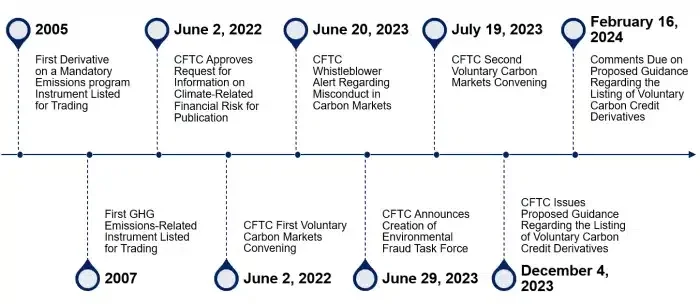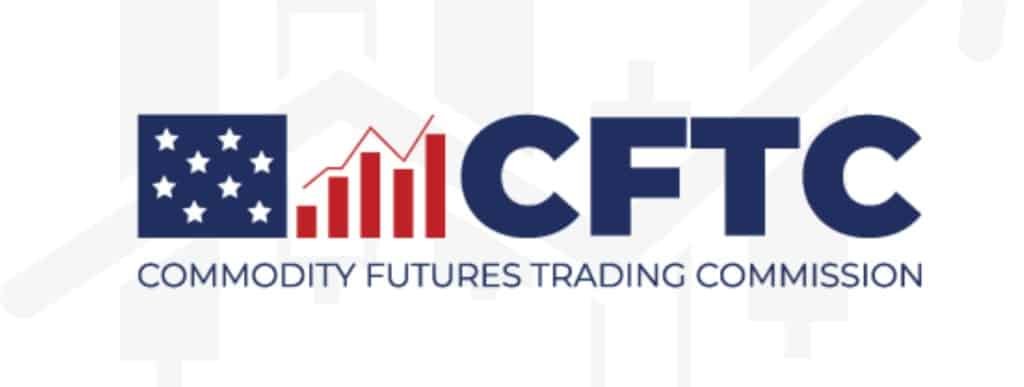The Commodity Futures Trading Commission (CFTC) introduced proposed guidance regarding the trading of voluntary carbon credit (VCC) derivative contracts. It sets out factors for designated contract markets (DCMs) to address specific provisions of the Commodity Exchange Act (CEA) and CFTC regulations.
The CFTC proposal seeks input on various VCC-related issues through 17 specific questions as part of the Biden Administration’s focus on climate issues. Comments for the proposal are open until Feb. 16, 2024.
What is CFTC’s Proposed Guidance All About?
Highlighting the importance of the proposal, CFTC’s Chairman Rostin Behnam noted:
“Today’s action by the CFTC is the culmination of a two-year examination of carbon markets, and many more years of in-depth work regarding the impacts of climate on financial markets.”
He further said that the agency’s objective is to help advance integrity leading to transparency, liquidity, and price discovery. These are all CFTC’s hallmarks in regulating markets and setting standards.
The Voluntary Carbon Market Proposed Guidance outlines three things for DCMs to consider:
- List only derivative contracts resistant to manipulation,
- Monitor contract terms in relation to the underlying commodity market, and
- Adhere to product submission requirements under Part 40 of CFTC Regulations and CEA section 5c(c).
The guidance aligns with ongoing initiatives to enhance VCC quality and VCM integrity. These particularly include the recent launch of the Core Carbon Principles (CCPs) by the Integrity Council for the Voluntary Carbon Market (ICVCM).
Moreover, the CFTC proposes DCMs factors in essential VCC commodity characteristics when designing VCC derivative contracts. This also involves focusing on three crucial considerations: quality standards, delivery points and facilities, and inspection provisions.
These guidelines fit into the distinct market and regulatory framework of the CFTC and the commodity-related markets it supervises. The VCM is one of them.
VCCs are tradable instruments that enable voluntary buying and selling rights to claim removal of or reductions in greenhouse gas (GHG) emissions. However, the VCMs encounter challenges in assessing VCC quality and associated carbon pricing. The CFTC’s guidance seeks to address these concerns.
What are CFTC’s Criteria for VCC?
The CFTC’s initial set of quality criteria for VCCs includes transparency, additionality, permanence and risk of reversal, and robust quantification. These align with Core Carbon Principles (CCPs) 7, 1, 2, and 3, respectively.
The guidance also discusses governance, tracking systems for VCCs, and avoiding double counting, which are crucial for carbon crediting programs responsible for issuing and monitoring the credits.
However, the CFTC’s guidance doesn’t talk about broader social and environmental considerations evident in voluntary quality efforts. This is why the agency is requesting feedback on whether DCMs should consider those concerns in VCC derivative design, even if it’s not part of the proposal.
The CFTC lacks direct statutory authority to impose standards on the VCC market. Instead, it relies on its broad anti-fraud and anti-manipulation authority along with oversight of CFTC-regulated exchanges, guided by core principles.
The agency has been taking actions to help carbon markets establish standards. Holland & Knight traces CFTC’s efforts in a timeline:

In October last year, U.S. lawmakers pushed the CFTC to deal with the integrity of carbon credit markets and regulate them.
The Proposed Guidance interprets the principles concerning VCC derivatives, guiding exchanges on demonstrating compliance regarding derivatives’ susceptibility to manipulation.
-
Essentially, the guide indirectly sets standards for the voluntary carbon credit market through the exchanges it oversees.
Much of what’s outlined in it is probably already part of exchanges’ diligence processes for listing VCC derivatives. However, the Guidance emphasizes that exchanges listing VCC contracts must rigorously vet the deliverable VCCs, including thorough reviews of relevant accreditation and verification providers.
Failure to do so might invite regulatory scrutiny if issues arise with the derivatives they list. This pressure on exchanges will likely push accreditation and verification providers to approve or verify higher-quality VCCs.
Looking ahead, although certain voluntary carbon standards may not be explicitly included in the final guidance, DCMs should stay attentive to evolving VCM consensus.
The CFTC guidance urges vigilance in various areas, recognizing voluntary carbon credit derivatives as new and evolving products requiring factors for consideration in product design and listing to foster transparency and liquidity in carbon markets.
Update: The CFTC has announced that it will issue the final carbon credits rulebook by the end of the year or as early as September.

